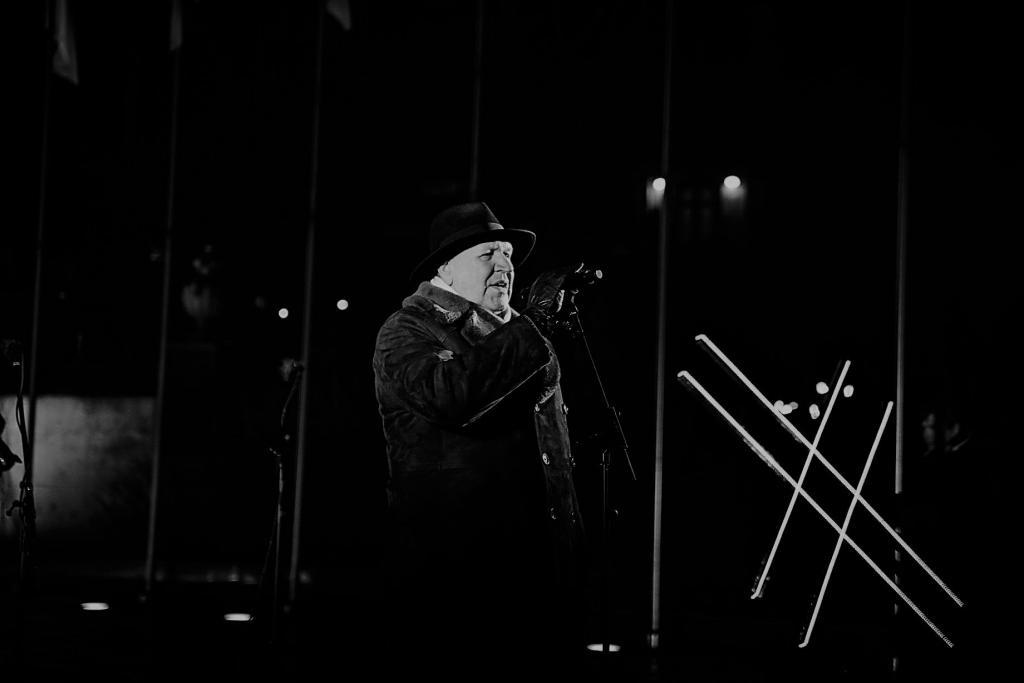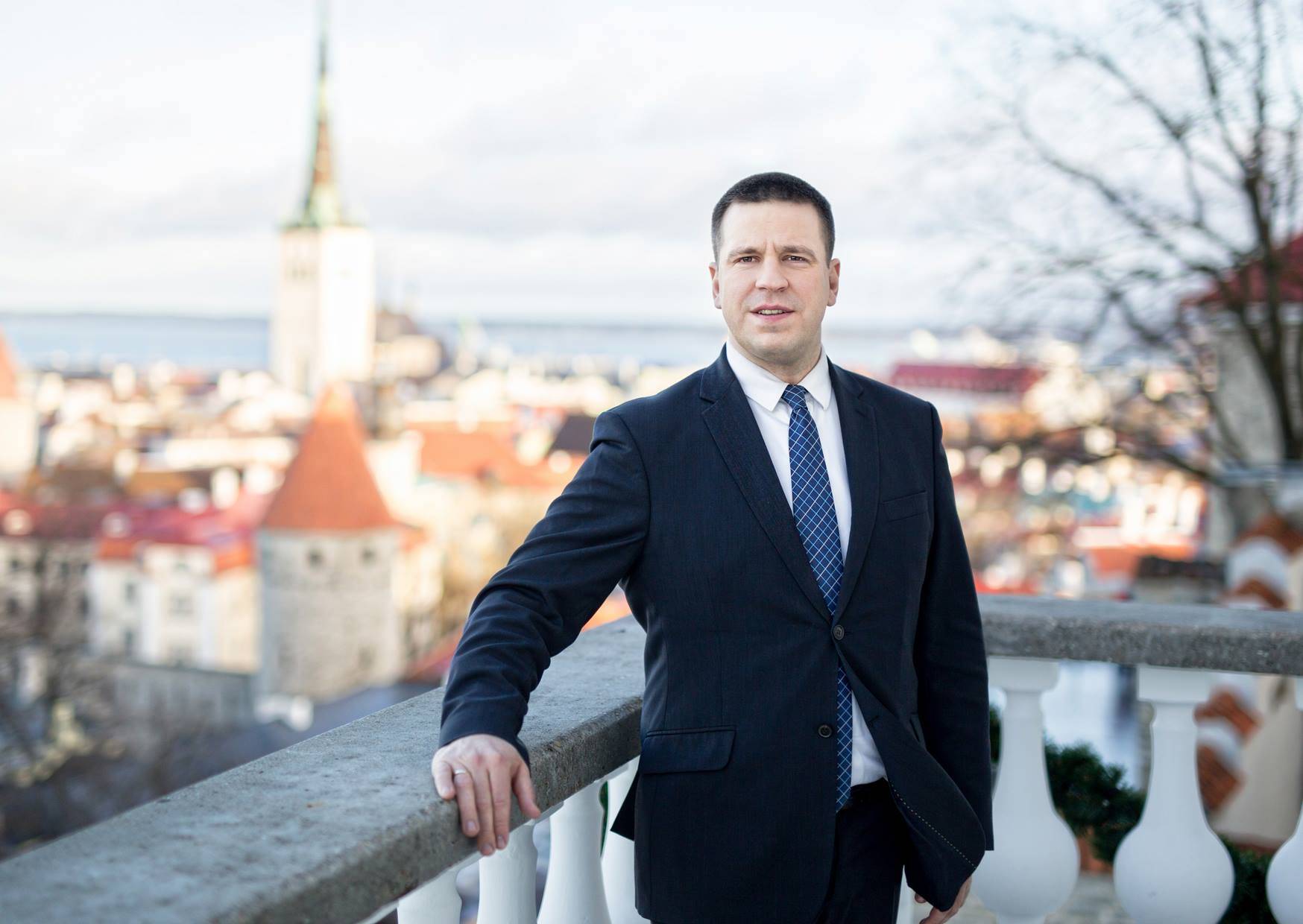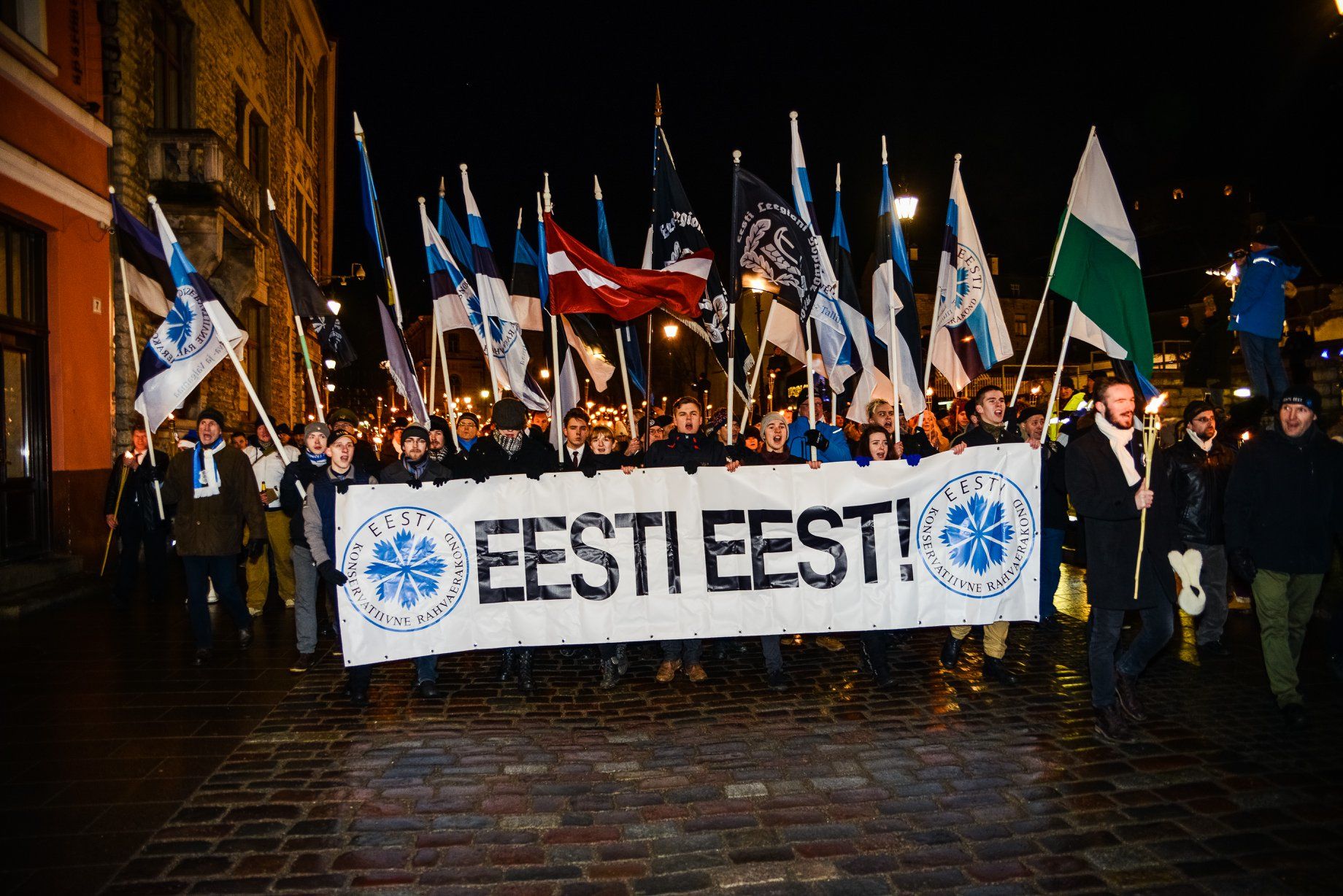If the Centre-EKRE-Isamaa coalition comes true in Estonia, the far-right EKRE will hold prime minister Jüri Ratas by the balls and dictate the coalition’s policy, Andrei Tuch writes.
The Estonian parliamentary election resulted in what initially looked like a rather worrying but non-apocalyptic result. Out of the 101 seats in the Riigikogu, the pro-business, pro-European Reform Party got 34; the incumbent coalition-leading, leftish-populist Centre Party got 26; the moderate nationalist Pro Patria (Isamaa) got 12 and the Social Democrats got 10. The worrying part was, the significant gain of the populist far-right Estonian Conservative People’s Party (EKRE), which ended up with a whopping 19 seats.
The election was the culmination of a three-year reversal in what Estonians were used to seeing: Reform had been in charge since 2007 but found itself in opposition for just about the first time in history, after the ejection of former chairman Edgar Savisaar* made Centre much more palatable to coalition partners Isamaa and the Social Democrats.
Reform’s downfall was a succession of deeply unpersonable leaders, from the grey cardinal, Siim Kallas (forever tainted by an association with a bank scandal in the early 90s), to Andrus Ansip (the EU’s longest-serving prime minister at one time, kicked upstairs to Brussels after literal street protests – not against his party or policy, but against his personality), to Jürgen Ligi, holder of many ministerial portfolios but not his tongue.
But while the Reform leadership was irritating, it wasn’t exactly incompetent, and the newly-minted prime minister, Jüri Ratas, had a small window to prove himself to an electorate that wasn’t very enthused about the palace coup. After passing a couple of successful headline policies – an income tax exemption for low-income earners and free public transport in the countryside – and taking a blow from a deeply unpopular increase in alcohol duties forced through by the Social Democrats, Ratas moved to the, erm, centre for the remainder of his term, making every effort to be a leader for the broad cross-section of the country.
It wasn’t quite good enough. But he only had this one chance to be prime minister, and he’ll be damned if he doesn’t hold onto that seat by any means necessary. If the country screwed him, well, the country can get screwed, too.
Sensible coalitions brushed aside
The post-election math meant there was no absolute winner – which is par for the course in Estonia – but there were two likely coalitions. The most probable one looked to be a Reform-Centre government; with just two parties holding a strong majority of parliamentary seats, it could be a stable partnership of moderates, and even a potential “coalition of unity”: one to make money and one to spend it, and by the late 2010s, Centre remained pretty much the default-choice representative of Estonia’s Russophone community as well. That one is rightish and the other is leftish was neither a problem nor a novelty (there was already a Reform-Centre cabinet from 2005 to 2007); there were some policy incompatibilities, but compromise is what coalitions do.
The other option was a return to the pre-2016 Reform-Isamaa-SDE teamup. Sure, there was some lingering bad blood on both sides, but Taavi Rõivas – the guy who was booted out of the Stenbock House (the official seat of the government of Estonia – editor) by the unlikely conservative-socialist teamup – was long gone from leadership. Reform is now headed by Kaja Kallas (the daughter of Siim Kallas).
It looked like Estonia, the eager poster child of Europe, would have simultaneously a female president (Kersti Kaljulaid was elected president in 2016 – editor) and a female prime minister. Heck, they could’ve gone for an elegant bit of statesmanship and offered the chairmanship of the Riigikogu to senior Centrist, Kadri Simson. Imagine the photo ops: Kersti, Kaja and Kadri – a blonde triumvirate and a bloody triumph!
Sure, the 19 cryptofascists in parliament were nothing to be happy about. But both Reform and the Social Democrats had said outright that they would not work with EKRE. Centre was not only a left-wing party (and, on traditional policy markers, farther left than the Social Democrats!), but also the party of Russophones; and just a few years ago Kadri Simson became the unlikely champion of Estonia’s (admittedly half-baked) Civil Unions Act (that allows same-sex couples to legally register their cohabitation – editor). Centre had nothing to offer or gain from the party of “Estonia First” (And Ban Abortions While You’re At It).
Except, that is, for the premiership.
A coalition of Centre, Isamaa and the neo-nazis brewing
Over the week following election day, Reform made overtures towards Centre first, then towards Isamaa and SDE. While the Social Democrats have now said they are happy to join Reform, the two others were oddly reticent to begin the horse-trading for policies and cabinet seats. And now we know why. In a highly improbable twist of algebra, it seems there is a new coalition brewing: that of Centre, Isamaa and the neo-nazis.
Or rather, I should say, a coalition of EKRE with Centre and Isamaa support (described in Estonia with an abbreviation EKREIKE).
There was a time, back in the 2000s, when Reform’s rejection of a possible coalition with IRL (the union of Isamaa and Res Publica, a once-mighty but quickly spent centre-right endeavour) was explained by Andrus Ansip’s fear of being the Prime Minister in a Mart Laar** government. If an EKREIKE coalition does happen, Jüri Ratas will keep the Stenbock House office he so treasures, but he will be no more than the figurehead of a Mart Helme (the leader of EKRE – editor) government.
Not everyone shares this opinion. They point at the True Finns (a milder version of EKRE in Finland – editor) over in the North and say a stint as a junior partner in government will drive EKRE either to the mainstream – or out of relevance. They will either move to the centre just like Ratas did – or disappoint their core voter base and lose most of their seats in the next election.
And maybe they would, indeed, end up going mainstream like the True Finns – if they had been brought in as a junior partner to someone like Res Publica (a former political party that won the parliamentary election in 2003) at the peak of its power. A radical far-right party supporting a centre-right PM, against what they perceive as a red onslaught, might indeed find that once the substantive part of their manifesto is implemented, the broad base of frightened and uneasy voters gets siphoned off and they’re left with nothing but the lunatic fringe.
Succumbed to unbridled populism
Here’s the thing, though: EKRE has nothing to lose. Its voters are not the economically dispossessed, like the working-class Brexiteers of the austerity-ravaged United Kingdom – Estonia’s economic growth continues, unemployment is low, salaries are growing nicely and even the inflation is under control.
Nor is EKRE the voice of a rightward swing of a Scandinavian Welfare State that is worried about uncontrolled government spending and the national debt – EKRE’s actual stated policies are a mix of taking out loans to hand out money to the people (as long as those people are ethnic Estonians – with the purity criteria defined by the EKRE leadership, natch) while getting rid of most taxes.
Nor is it the voice of those genuinely worried about security: EKRE’s geopolitical stance is to get Estonia out of burdensome international commitments like the EU (where, mind you, tiny Estonia is one voice out of twenty-seven, a position of power it could hardly hope for anywhere else; and if you don’t believe Brussels stands up for the interests of the small countries, ask the Irish!), and basically just assume that our safety is guaranteed by the personal integrity of Donald Trump.
And most certainly, the EKRE voter is not the same as the upper-middle-class gay men of Amsterdam who vote for Geert Wilders (a populist Dutch politician – editor), so that he’d protect them from Sharia law.
The EKRE voter is, at the most charitable end, someone who’s succumbed to unbridled populism. But Estonia’s economy is in great shape, whether you’re a software developer or a construction worker. And the migrant crisis on Europe’s doorstep has so far resulted in a grand total of two hundred people and change coming to Estonia. That’s less than a cruise ship’s worth (and many of those have already left for Germany, where salaries are higher, the weather is more tolerable and not every meal is pork).
If you’re seeing someone on a Tallinn street – outside of the Old Town or the Cultural Kilometre – who has an interesting skin tone, then they’re most likely doing a master’s degree at TalTech while simultaneously contributing a healthy amount of payroll taxes to the Estonian budget, dude.
Deluded voters
The EKRE voter may delude themselves into thinking they are standing up for Great Estonia, or that they are fighting back a resurgent wave of Communist terror (they like to call everyone who opposes EKRE a socialist and intend it as a terrible slur***). They might even tell themselves they are voting against a man who allegedly once stole ten million dollars from a failed bank (and end up voting for a man – an EKRE MP Jaak Madison – who definitely stole an iPhone on the overnight ferry to Stockholm).
But the EKRE voter is a voter who is miserable and the source of his misery must be somewhere else than himself. It could be the woman in his life who left him and took the kids (or had the temerity to make a choice to not have his kids). It could be the unelected Brussels bureaucrats****. It could be the boss who yelled at him the other day – that asshole of a boss with his fancy college education and his too-tight jeans, a sure sign that he is one of them gays. It could be the ISIS infiltrator who is just biding his time before he turns Võrumaa into a caliphate. Or, if all else fails, it’s got to be George Soros.
Estonian voters have a naturally elevated level of background misery; and let’s be honest, there’s also a fair amount of racism here. It’s almost impossible to grow up in a country where everyone looks like you and not feel uneasy around someone who doesn’t. You’re not a terrible person because you have a cognitive bias, you’re only a terrible person if you embrace it.
Estonia’s xenophobic streak has always been there – from jokes about six-toed Latvians to the expulsion of Baltic Germans after 1918, to the reason why that Tujurikkuja (an Estonian television entertainment show – editor) cover of Ei Ole Üksi Ükski Maa (an important Singing Revolution-era protest song – editor) is so paralyzingly hilarious.
Jüri Ratas is not a statesman
This is why EKRE has nothing to lose, and by having nothing to lose, it will control Jüri Ratas’s government. For three years, Ratas looked like a capable statesman, but it is now obvious that he cares more about his own position as prime minister than he does about the country. And EKRE can’t help but exploit that. Like the Northern Irish Unionists who are holding Theresa May’s government hostage in the UK, EKRE will hold Ratas hostage, dictating policies and threatening to go into opposition if they don’t get what they want. Because if it fails as a party in government, it won’t make its voters disappointed and dissatisfied with them.
As history teaches us, when the Great Leader fails to live up to his promises, it is never the fault of the Great Leader. It is only due to sabotage from the Enemies of the People. And so, the Enemies of the People must be hunted down and purged.
As for Jüri Ratas, history will not remember him as the man who made the minimum wage free of income tax. It will remember him as the man who put the neo-Nazis in power in Estonia.
P.S.: For an excellent in-depth political analysis of the situation, point your Google Translate at www.poliitika.guru/risk.
—
* Edgar Savisaar lost his grip on the Centre Party partially due to health issues and partially due to being indicted on corruption charges. At time of writing, his criminal trial was halted because he was found too ill to face the court. He was not acquitted.
** Mart Laar, two-time prime minister, was the architect of Estonia’s free-market economy and capitalist miracle. He is now also out of politics on health grounds, but even when his party did badly, Laar enjoyed what was probably the second-biggest reserve of personal authority after near-mythical president Lennart Meri.
*** Never mind that EKRE happily hosted Estonia’s pro-Kremlin fringe, under the logic that those guys also hate the LGBT community and that makes them fellow travellers.
**** Stay tuned; we’re electing our Brussels bureaucrats two months from now.
I
The opinions in this article are those of the author. Cover: Mart Helme, the leader of the EKRE party (the image is illustrative).




